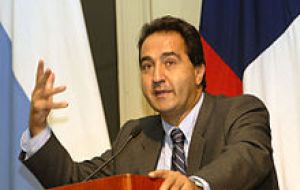MercoPress. South Atlantic News Agency
Students and police clash in Santiago; mayor threatens to cancel protestors scholarships
 Mayor Zalaquett warning was supported by Education Minister Harald Beyer
Mayor Zalaquett warning was supported by Education Minister Harald Beyer For a third day running Chilean riot police broke up protests by students who had taken control of several high schools in the capital Santiago to demand education reform.
Hundreds of high school students also blocked traffic in Santiago and Mayor Pablo Zalaquett threatened to remove scholarships from students who join the school takeovers. His plan was criticized by other mayors calling it an abuse of power, but it received public support from Education Minister Harald Beyer.
“I think it’s sensible for a mayor who has limited resources to use these recourses on students who are committed to education,” Beyer told reporters. “We have to look out for the right to education.”
The changes sought by students who have been protesting and boycotting classes all week would fundamentally overhaul a school system that has been privatized since the 1973-90 dictatorship of Gen. Augusto Pinochet.
Mass demonstrations initially raised expectations for profound changes, but more than a year after the first protests, few students have seen any real benefits. Protesters say the system still fails families with poor quality public schools, expensive private universities, unprepared teachers and banks that make education loans at high interest rates that most Chileans can ill afford.
The government plans to raise about a1 billion dollars in taxes for education, but students say it’s not enough. In an interview with The Associated Press earlier this year, Beyer said the government would not cede to their demands for free education, calling it an unfair, backward-looking policy.
Last week, police used water cannons to break up a march by thousands of students in a protest where hooded vandals set three city buses on fire, 75 people were arrested and 49 Carabineros were injured. The government criticized student leaders for allowing the march that had been banned by Santiago’s municipal government.
Gabriel Boric, the president of the University of Chile student federation, initially said the burning of the Transantiago mass transit system buses had been staged. But on Tuesday, over Twitter, he said he regretted the “unfortunate” comment. Presidential spokesman Andres Chadwick said he praised the retraction.
President Sebastian Piñera approval ratings have plunged with the protests making him the most unpopular Chilean leader since the country returned to democracy in 1990.
Piñera has refused to radically change the education system and instead has proposed to fund thousands of new scholarships and lower student loan interest from an average of 6% to 2%. He says the plan, which passed the lower house and is being debated in the Senate, would allow more promising students to attend the best schools in Chile and slash the financial burden on their families.
Student leaders say real change will only come when the private sector is regulated and education is no longer a for-profit business.




Top Comments
Disclaimer & comment rules-

-

-

Read all commentsIt is ironic how the students that are benefiting from one of if the not the best educational systems in Latin America, are at the same time trying to destroy it. The dictator Pinochet implemented this system because free market works to improve the quality of any product or service, including education. Obviously the providers of this service are out to make money, but competition will force the price to always be the lowest possible; if not, that particular school will be pushed out of the market by one that can offer the same quality service at lower price. If the government must provide a socialist “hand” in the matter, just give the outstanding poor students scholarships to the best private schools.
Aug 15th, 2012 - 05:13 pm 0If the private schools are regulated too much, or their profits taxed too heavily, private schools will leave the country as it won't be worth the investment anymore. Everyone will lose out as the government will have to take on a huge burden and thus increase taxes to help pay for the increased costs. Quality WILL go down. It is such a shame that people can't see this.
““I think it’s sensible for a mayor who has limited resources to use these recourses on students who are committed to education,” Beyer told reporters”
Aug 15th, 2012 - 06:40 pm 0The protesters ARE committed to education, thats why they want it reformed!
BK,
Aug 15th, 2012 - 09:04 pm 0That is true to some extent, but you can't blame the mayor for attempting to discourage children from ransacking their schools, many of which are already in a poor state of repair. Although there is a real political issue underneath this, there is also a lot of opportunistic vandalism and political manipulation. How much do does the average 14 year old really care about educational reform?
Last year children in public schools lost a whole year of their school education and as a result, this year there was an exodus of children leaving the public system for the subsidised schools.
Commenting for this story is now closed.
If you have a Facebook account, become a fan and comment on our Facebook Page!